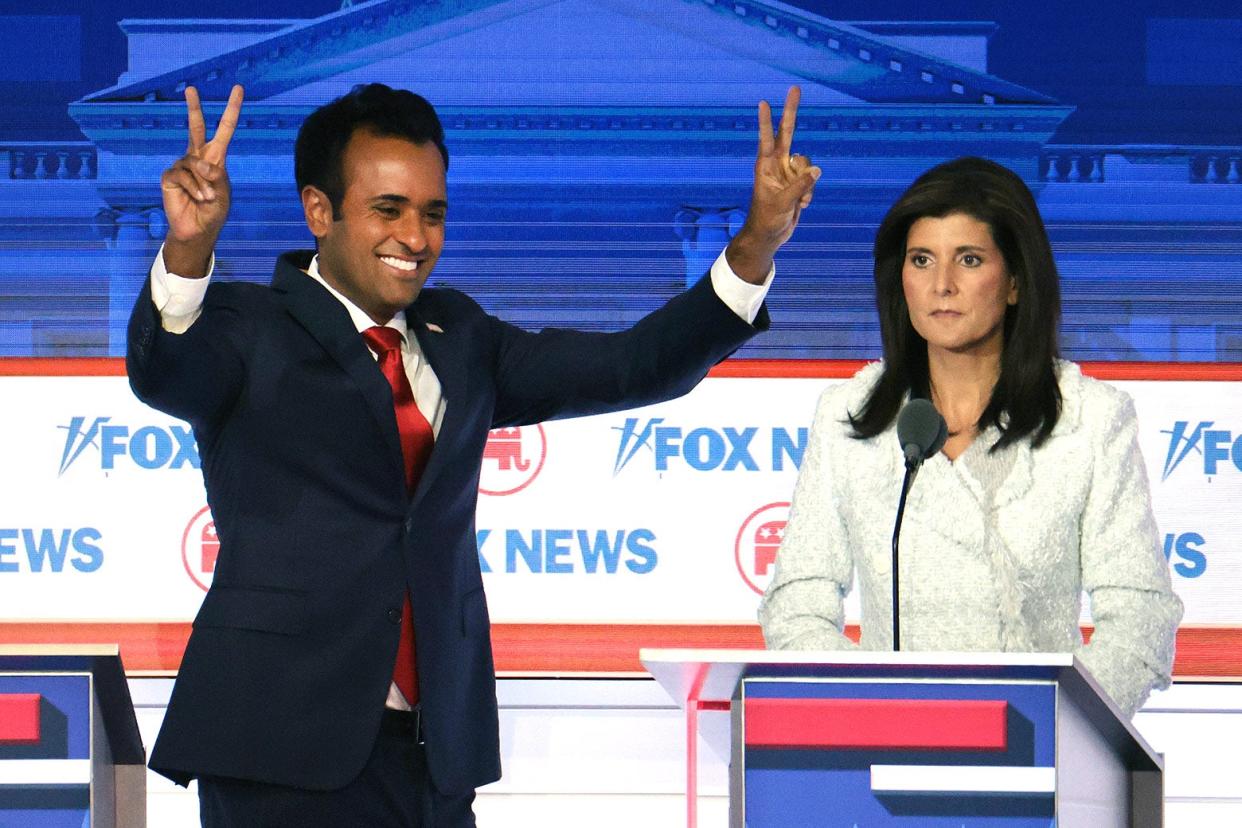Nikki Haley Seizes Control of Republican Race (but Only in an Alternate Universe)

- Oops!Something went wrong.Please try again later.
- Oops!Something went wrong.Please try again later.
- Oops!Something went wrong.Please try again later.
At Wednesday night’s Republican presidential primary debate, former South Carolina Gov. and United Nations Ambassador Nikki Haley looked comfortable onstage and made a series of fluid, coherent, and strategically savvy statements about what positions the Republican Party’s presidential nominee should take on a number of issues.
On the subject of abortion, she observed that the Senate is extremely unlikely to approve a federal ban, said contraception should be available to every woman, and proposed an effort to find “consensus” on issues like late-term abortion, the encouragement of adoption, and conscientious objection–style opt-outs for doctors and nurses who believe abortions are immoral.
She said that climate change is real but that the U.S. needs to make China and India lower their emissions. In response to a moderator’s question, she confirmed that she believes “biological boys” shouldn’t play girls’ sports in school, but only after a numbing paragraph of lukewarm rhetoric about how the most important thing is that kids learn to read and schools have “transparency” with their parents and zzzzzzzzzz. She said that Trump is “the most disliked politician in America” (a fair accusation) and that Mike Pence was right not to help him overturn the 2020 election .
The merits of each of those claims aside, they would likely go over well with the general electorate—or, more to the point, they are ambiguous and friendly-sounding enough that they wouldn’t hurt her candidacy, which, when paired with the built-in advantage Republicans usually have on their perceived ability to “handle” the issues of the economy and crime, could make her a formidable challenger to Joe Biden.
In fact, independent voters in Wisconsin assembled by the progressive polling organization Navigator—i.e., the precise swing-state audience likely to determine who will win in 2024—considered Haley the debate’s “winner” by a 19 percent margin:
Interesting post-debate results from a @NavigatorSurvey dial test among Independents in Milwaukee. Independents saw Haley as the winner, which I assume won't be the case in post-debate polls among GOP voters and shows how these debates will just alienate the middle over and over. pic.twitter.com/Kl2KbEFE8A
— Nick Gourevitch (@nickgourevitch) August 24, 2023
Nikki Haley did a nice job at the debate. But does it matter? No!
In a poll that asked Republican voters who had the best debate performance, Haley finished fifth. (Show-offy provocateur Vivek Ramaswamy finished first.) Donald Trump, who wasn’t even in Milwaukee, will continue to lead the race by some 40 points when post-debate polls are released. Haley would have done well for herself in a world in which the U.S. president was selected via multicandidate ranked choice voting, or even one in which Republican primary voters were simply as attuned to “electability” as their Democratic counterparts. Unfortunately for her, the only world she can experience, as far as the limitations of our consciousness are concerned, is this one, in which a determinative mass of GOP voters believes not just that Donald Trump is the most electable candidate in the party’s primary field, but that he actually won the last election, too.
One need not feel sympathy for Nikki Haley, who helped create these circumstances. She described herself as “giddy” about Trump’s victory in 2016, contributed her credibility to his administration by joining it as U.N. ambassador, and reportedly spoke to him frequently to angle for influence by disparaging others who worked for him. She appeared on Fox News in January 2021 to argue that he did not deserve to be impeached over Jan. 6, and until this point in the race has only criticized him in a wishy-washy, indirect way. At several junctures, she’s told Republican voters that Donald Trump is fit to be president, and they listened to her. Isn’t that nice?

